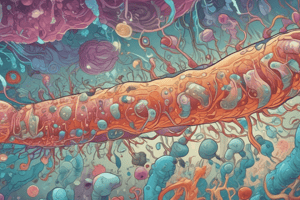Podcast
Questions and Answers
Which disease is not caused by bacteria?
Which disease is not caused by bacteria?
- Diabetes (correct)
- Diphtheria
- Pneumonia
- Tuberculosis
Which of the following is an effect of bacteria on food?
Which of the following is an effect of bacteria on food?
- Gelling
- Spoilage (correct)
- Fermentation
- Preservation
What term is used for bacteria that can destroy flesh and tissues of the host?
What term is used for bacteria that can destroy flesh and tissues of the host?
- Probiotic bacteria
- Parasitic bacteria
- Virulent bacteria
- Flesh-eating bacteria (correct)
Which condition is NOT caused by bacterial activity?
Which condition is NOT caused by bacterial activity?
What do some bacteria degrade that results in the destruction of textiles?
What do some bacteria degrade that results in the destruction of textiles?
Which of the following diseases is caused by bacteria?
Which of the following diseases is caused by bacteria?
What other serious condition, besides diseases and allergies, can bacteria cause?
What other serious condition, besides diseases and allergies, can bacteria cause?
Which of the following is NOT a result of harmful bacterial activity?
Which of the following is NOT a result of harmful bacterial activity?
What is a common effect of bacteria on daily life items like wooden articles?
What is a common effect of bacteria on daily life items like wooden articles?
Which of the following health issues can bacteria induce?
Which of the following health issues can bacteria induce?
Flashcards are hidden until you start studying
Study Notes
What is Bacteria?
- Bacteria are small, single-celled organisms found almost everywhere on Earth.
- They are vital to the planet's ecosystems and can live under extreme conditions of temperature and pressure.
- The human body contains more bacterial cells than human cells, with most being harmless and some even helpful.
Types of Bacteria
- Bacteria are classified into four major groups based on their cell shape and physical structure:
- Spherical (cocci)
- Rod (bacilli)
- Spiral (spirilla)
- Comma (vibrios)
Structure of a Bacteria
- A typical bacterial cell consists of:
- Cell wall
- Plasmid DNA
- Flagellum
- Cytoplasm
- Bacterial DNA (Chromosomal DNA)
Reproduction in Bacteria
- Bacteria reproduce through binary fission, an asexual mode of reproduction.
- A single bacterium divides into two identical daughter cells.
- Replication of DNA within the parent bacterium marks the beginning of the fission.
- The rate and timing of reproduction depend on conditions like temperature and availability of nutrients.
Useful Bacteria
- Not all bacteria are harmful to humans; some are beneficial in different ways:
- Convert milk into curd (Lactobacillus)
- Ferment food products (Streptococcus and Bacillus)
- Help in digestion and improving the body's immunity system (Actinobacteria, Bacteroidetes, Firmicutes, Proteobacteria)
- Produce antibiotics (Soil bacteria)
Harmful Activity of Bacteria
- Bacteria cause diseases in plants and animals, leading to indirect human impacts.
- Bacteria cause many human diseases, entering the body through openings, air, food, and water, or through skin wounds.
- Bacterial diseases harm people in two ways:
- Interfering with normal body tissue function
- Releasing toxins that directly attack the host
- Additionally, bacteria are linked to:
- Cancer
- Food spoilage
- Allergies and chronic inflammation
- Flesh-eating diseases
- Infectious diseases like pneumonia, tuberculosis, and tooth decay
- Cellulose degradation, destroying textiles and wooden articles
Studying That Suits You
Use AI to generate personalized quizzes and flashcards to suit your learning preferences.




